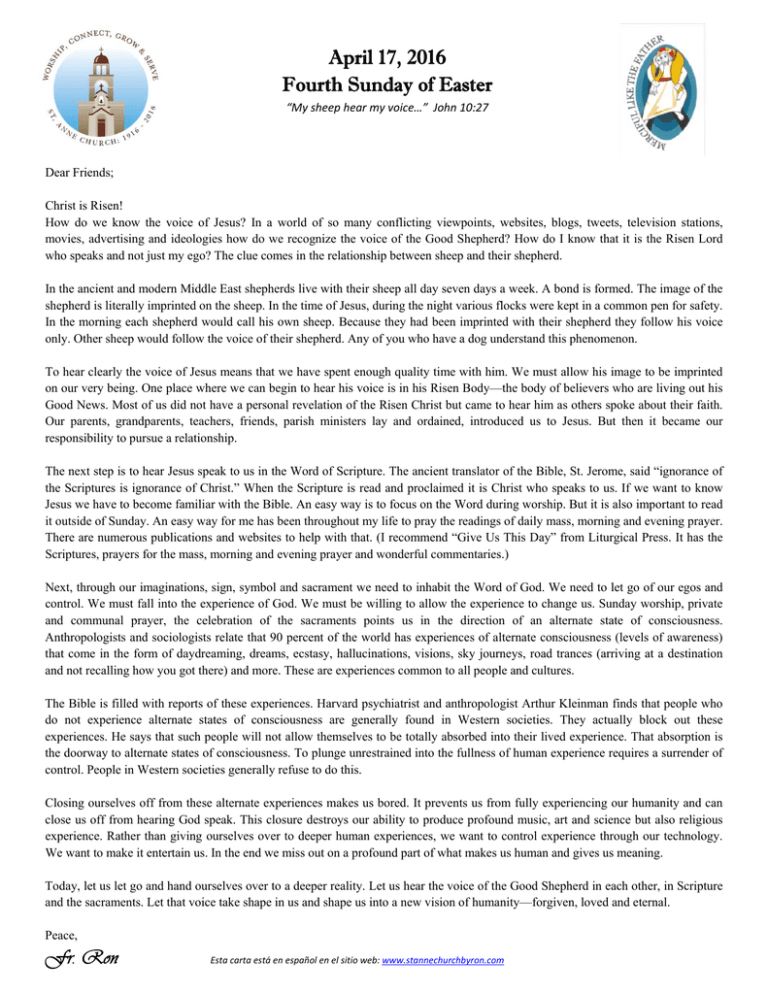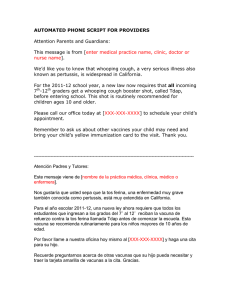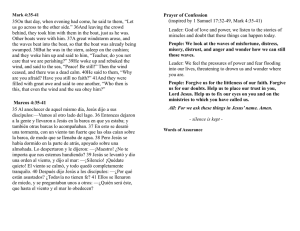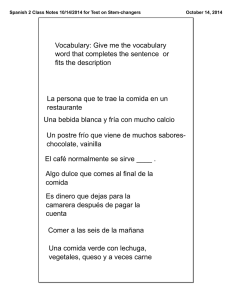April 17, 2016 Fourth Sunday of Easter Fr. Ron
Anuncio

April 17, 2016 Fourth Sunday of Easter “My sheep hear my voice…” John 10:27 Dear Friends; Christ is Risen! How do we know the voice of Jesus? In a world of so many conflicting viewpoints, websites, blogs, tweets, television stations, movies, advertising and ideologies how do we recognize the voice of the Good Shepherd? How do I know that it is the Risen Lord who speaks and not just my ego? The clue comes in the relationship between sheep and their shepherd. In the ancient and modern Middle East shepherds live with their sheep all day seven days a week. A bond is formed. The image of the shepherd is literally imprinted on the sheep. In the time of Jesus, during the night various flocks were kept in a common pen for safety. In the morning each shepherd would call his own sheep. Because they had been imprinted with their shepherd they follow his voice only. Other sheep would follow the voice of their shepherd. Any of you who have a dog understand this phenomenon. To hear clearly the voice of Jesus means that we have spent enough quality time with him. We must allow his image to be imprinted on our very being. One place where we can begin to hear his voice is in his Risen Body—the body of believers who are living out his Good News. Most of us did not have a personal revelation of the Risen Christ but came to hear him as others spoke about their faith. Our parents, grandparents, teachers, friends, parish ministers lay and ordained, introduced us to Jesus. But then it became our responsibility to pursue a relationship. The next step is to hear Jesus speak to us in the Word of Scripture. The ancient translator of the Bible, St. Jerome, said “ignorance of the Scriptures is ignorance of Christ.” When the Scripture is read and proclaimed it is Christ who speaks to us. If we want to know Jesus we have to become familiar with the Bible. An easy way is to focus on the Word during worship. But it is also important to read it outside of Sunday. An easy way for me has been throughout my life to pray the readings of daily mass, morning and evening prayer. There are numerous publications and websites to help with that. (I recommend “Give Us This Day” from Liturgical Press. It has the Scriptures, prayers for the mass, morning and evening prayer and wonderful commentaries.) Next, through our imaginations, sign, symbol and sacrament we need to inhabit the Word of God. We need to let go of our egos and control. We must fall into the experience of God. We must be willing to allow the experience to change us. Sunday worship, private and communal prayer, the celebration of the sacraments points us in the direction of an alternate state of consciousness. Anthropologists and sociologists relate that 90 percent of the world has experiences of alternate consciousness (levels of awareness) that come in the form of daydreaming, dreams, ecstasy, hallucinations, visions, sky journeys, road trances (arriving at a destination and not recalling how you got there) and more. These are experiences common to all people and cultures. The Bible is filled with reports of these experiences. Harvard psychiatrist and anthropologist Arthur Kleinman finds that people who do not experience alternate states of consciousness are generally found in Western societies. They actually block out these experiences. He says that such people will not allow themselves to be totally absorbed into their lived experience. That absorption is the doorway to alternate states of consciousness. To plunge unrestrained into the fullness of human experience requires a surrender of control. People in Western societies generally refuse to do this. Closing ourselves off from these alternate experiences makes us bored. It prevents us from fully experiencing our humanity and can close us off from hearing God speak. This closure destroys our ability to produce profound music, art and science but also religious experience. Rather than giving ourselves over to deeper human experiences, we want to control experience through our technology. We want to make it entertain us. In the end we miss out on a profound part of what makes us human and gives us meaning. Today, let us let go and hand ourselves over to a deeper reality. Let us hear the voice of the Good Shepherd in each other, in Scripture and the sacraments. Let that voice take shape in us and shape us into a new vision of humanity—forgiven, loved and eternal. Peace, Fr. Ron Esta carta está en español en el sitio web: www.stannechurchbyron.com 17 de Abril, 2016 Cuarto Domingo de Pascua “Mis ovejas escuchan mi voz…” Juan 10:27 Queridos amigos; Cristo ha resucitado! ¿Cómo conocemos la voz de Jesús? En un mundo de tantos puntos de vista contradictorios, sitios web, blogs, tweets, canales de televisión, películas, publicidad e ideologías ¿Cómo reconocemos la voz del buen pastor? ¿Cómo sé que es el resucitado quien habla y no sólo mi ego? La clave viene en la relación entre las ovejas y su pastor. En el Medio Oriente antiguo y moderno los pastores viven con sus ovejas durante todo el día siete días a la semana. Se forma un enlace. Literalmente está impresa la imagen del pastor en las ovejas. En la época de Jesús, durante la noche varios rebaños se mantuvieron en un corral común por su seguridad. En la mañana, cada pastor llamaría sus propias ovejas. Porque habían sido impresos con su pastor, ellas siguen solamente su voz. Otras ovejas siguen la voz de su pastor. Cualquiera de ustedes que tienen perro entienden este fenómeno. Escuchar claramente la voz de Jesús significa que hemos pasado suficiente tiempo de calidad con él. Debemos permitir que su imagen quede impreso en nuestro ser. Un lugar donde podemos empezar a escuchar su voz es en su cuerpo resucitado, el cuerpo de creyentes que viven sus buenas noticias. La mayoría de nosotros no tenía una revelación personal de el Cristo resucitado, mas bien lo escuchamos cuando otros hablaban de su fe. Nuestros padres, abuelos, maestros, amigos, ministros parroquiales laicos y ordenados, nos presentaron a Jesús. Pero luego se convirtió en nuestra responsabilidad el crear una relación con el. El siguiente paso es escuchar a Jesús hablar con nosotros en la palabra de la escritura. El antiguo traductor de la Biblia, San Jerónimo, dijo que «la ignorancia de las escrituras es ignorancia de Cristo». Cuando la escritura es leída y proclamada es el mismo Cristo quien nos habla. Si queremos conocer a Jesús hay que familiarizarse con la Biblia. Una manera fácil es centrarse en la palabra durante la adoración. Pero también es importante leer fuera del Domingo. Una manera fácil para mí ha sido a lo largo de mi vida orar las lecturas de la Misa diaria, y oración por la mañana y tarde. Existen numerosas publicaciones y sitios web para ayudar con eso. Después, a través de nuestra imaginación, signo, símbolo y Sacramento tenemos que habitar en la palabra de Dios. Tenemos que dejar nuestros egos y control. Nosotros debemos caer en la experiencia de Dios. Debemos estar dispuestos a permitir que la experiencia nos cambie. El culto de los Domingos, oración privada y comunitaria, la celebración de los sacramentos nos apuntan en la dirección de un estado alterno de conciencia. Antropólogos y sociólogos dicen que el 90 por ciento del mundo tiene experiencias de conciencia alternativa (niveles de conciencia) que se manifiestan al soñar despiertos, sueños nocturnos, éxtasis, alucinaciones, visiones, viajes de aéreos, trances de carretera (llegar a un destino y no recordar cómo se llegó allí) y más. Estas son experiencias comunes en todos los pueblos y culturas. La Biblia está llena de informes de estas experiencias. El psiquiatra y antropólogo de Harvard Arthur Kleinman considera que quienes no experimentan estados alternos de conciencia se encuentran generalmente en las sociedades occidentales. En realidad bloquean estas experiencias. Él dice que tales personas no permitirán ser totalmente absorbidos por su experiencia vivida. Que la absorción es la puerta a Estados alternos de conciencia. Para sumergirse sin restricciones en la plenitud de la experiencia humana se requiere de una entrega de control. Las personas de las sociedades occidentales generalmente se niegan a hacerlo. El cerrarnos a estas experiencias alternativas nos aburre. Nos impide experimentar plenamente nuestra humanidad y nos puede cerrar a escuchar la voz de Dios que nos habla. Este cierre destruye nuestra capacidad de producir profunda música, arte y ciencia y también a la experiencia religiosa. En lugar de entregarnos a las experiencias humanas más profundas, queremos controlar la experiencia a través de nuestra tecnología. Queremos ser entretenidos. Al final nos perdemos de una parte profunda de lo que nos hace humanos y nos da sentido. Hoy, vamos a dejarnos ir y entregarnos a una realidad más profunda. Queremos escuchar la voz del buen pastor en unos a otros, en las escrituras y los sacramentos. Dejemos que esa voz tome forma en nosotros y nos forme en una nueva visión de la humanidad — perdonada, amada y eterna. Paz, Fr. Ron Esta carta está en español en el sitio web: www.stannechurchbyron.com




